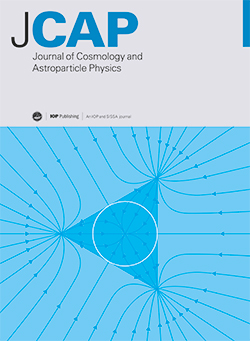Detecting the stochastic gravitational wave background from primordial black holes in slow-reheating scenarios
IF 5.3
2区 物理与天体物理
Q1 ASTRONOMY & ASTROPHYSICS
Journal of Cosmology and Astroparticle Physics
Pub Date : 2024-12-05
DOI:10.1088/1475-7516/2024/12/011
引用次数: 0
Abstract
After primordial inflation, the universe may have experienced a prolonged reheating epoch, potentially leading to a phase of matter domination supported by the oscillating inflaton field. During such an epoch, perturbations in the inflaton virialize upon reentering the cosmological horizon, forming inflaton structures. If the primordial overdensities are sufficiently large, these structures collapse to form primordial black holes (PBHs). To occur at a significant rate, this process requires an enhanced primordial power spectrum (PPS) at small scales. The enhancement of the PPS, as well as the formation and tidal interaction of the primordial structures, will in turn source a stochastic gravitational wave background (SGWB) that could be detected by current and/or future gravitational wave detectors. In this paper, we study the SGWB arising from these different sources during slow-reheating, focusing on a PPS that satisfies the requirements necessary for the formation of PBHs with a mass of MPBH ≃ 1021 and that constitute the entirety of dark matter in the universe.求助全文
约1分钟内获得全文
求助全文
来源期刊

Journal of Cosmology and Astroparticle Physics
地学天文-天文与天体物理
CiteScore
10.20
自引率
23.40%
发文量
632
审稿时长
1 months
期刊介绍:
Journal of Cosmology and Astroparticle Physics (JCAP) encompasses theoretical, observational and experimental areas as well as computation and simulation. The journal covers the latest developments in the theory of all fundamental interactions and their cosmological implications (e.g. M-theory and cosmology, brane cosmology). JCAP''s coverage also includes topics such as formation, dynamics and clustering of galaxies, pre-galactic star formation, x-ray astronomy, radio astronomy, gravitational lensing, active galactic nuclei, intergalactic and interstellar matter.
 求助内容:
求助内容: 应助结果提醒方式:
应助结果提醒方式:


